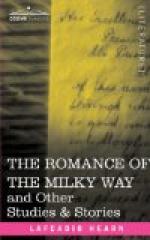—“Inscrutable is this complex consciousness which has slowly evolved out of infantine vacuity—consciousness which, in other shapes, is manifested by animate beings at large—consciousness which, during the development of every creature, makes its appearance out of what seems unconscious matter; suggesting the thought that consciousness, in some rudimentary form, is omnipresent."[65]
[Footnote 65: Autobiography, vol. ii, p. 470.]
—Of all modern thinkers, Spencer was perhaps the most careful to avoid giving encouragement to any hypothesis unsupported by powerful evidence. Even the simple sum of his own creed is uttered only, with due reservation, as a statement of three probabilities: that consciousness represents a specialized and individualized form of the infinite Energy; that it is dissolved by death; and that its elements then return to the source of all being. As for our mental attitude toward the infinite Mystery, his advice is plain. We must resign ourselves to the eternal law, and endeavor to vanquish our ancient inheritance of superstitious terrors, remembering that, “merciless as is the Cosmic process worked out by an Unknown Power, yet vengeance is nowhere to be found in it."[66]
[Footnote 66: Facts and Comments, p. 201.]
* * * * *
In the same brief essay there is another confession of singular interest,—an acknowledgment of the terror of Space. To even the ordinary mind, the notion of infinite Space, as forced upon us by those monstrous facts of astronomy which require no serious study to apprehend, is terrifying;—I mean the mere vague idea of that everlasting Night into which the blazing of millions of suns can bring neither light nor warmth. But to the intellect of Herbert Spencer the idea of Space must have presented itself after a manner incomparably more mysterious and stupendous. The mathematician alone will comprehend the full significance of the paragraph dealing with the Geometry of Position and the mystery of space-relations,—or the startling declaration that “even could we penetrate the mysteries of existence, there would remain still more transcendent mysteries.” But Herbert Spencer tells us that, apart from the conception of these geometrical mysteries, the problem of naked Space itself became for him, in the twilight of his age, an obsession and a dismay:—




